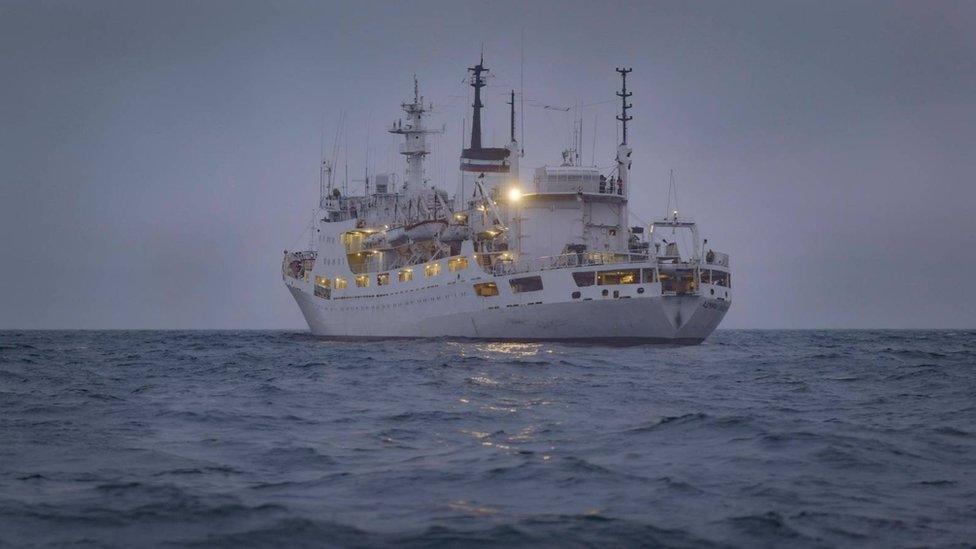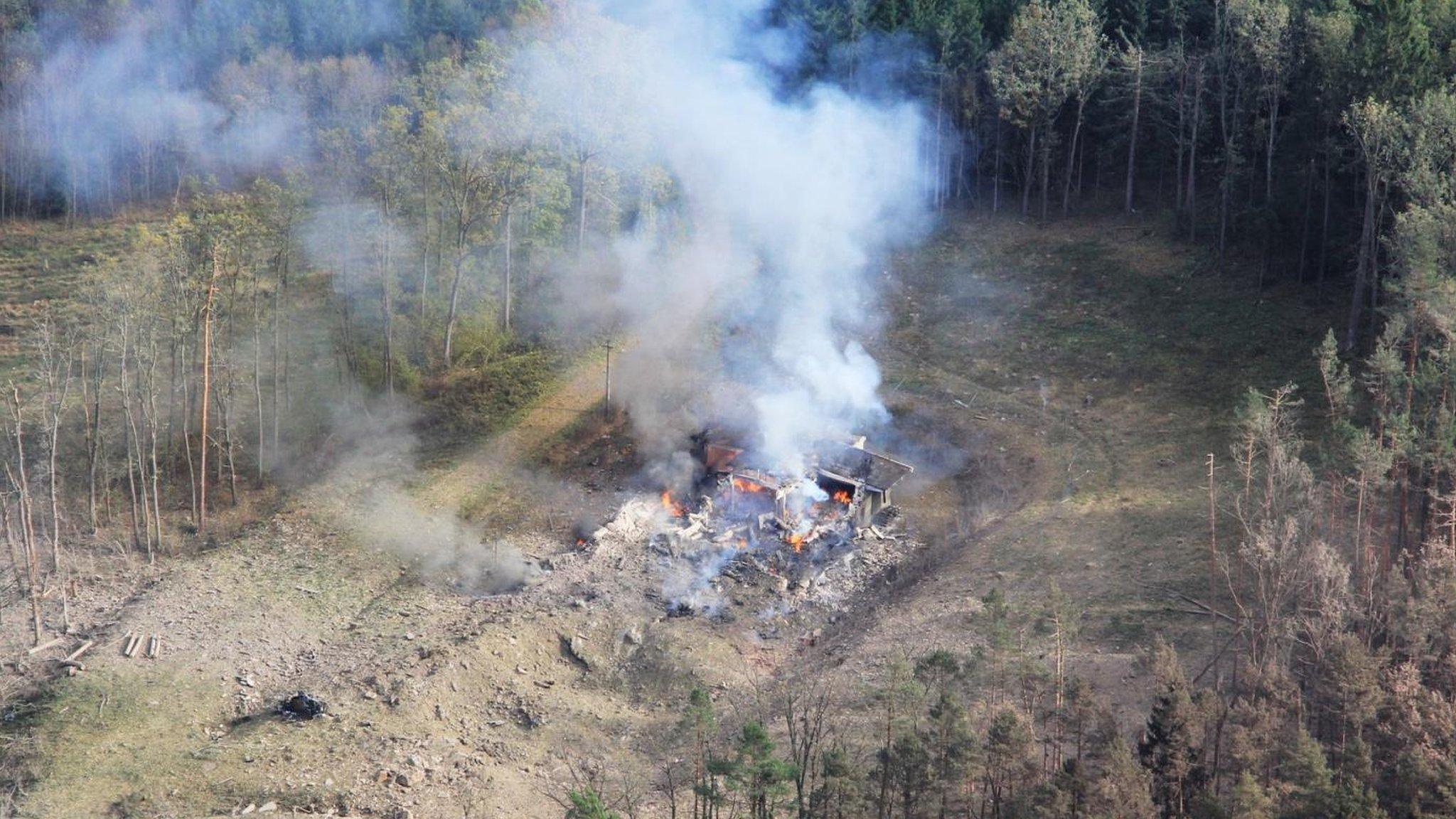Ukraine war: The Russian ships accused of North Sea sabotage
- Published
- comments
Watch: Danish reporters film armed men on guard as they approach the Admiral Vladimirsky
Russia has a programme to sabotage wind farms and communication cables in the North Sea, according to new allegations.
The details come from a joint investigation by public broadcasters in Denmark, Norway, Sweden and Finland.
It says Russia has a fleet of vessels disguised as fishing trawlers and research vessels in the North Sea.
They carry underwater surveillance equipment and are mapping key sites for possible sabotage.
The BBC understands that UK officials are aware of Russian vessels moving around UK waters as part of the programme.
The first of a series of reports is due to be broadcast on Wednesday, external by DR in Denmark, NRK in Norway, SVT in Sweden and Yle in Finland.

The report focuses on a Russian vessel called the Admiral Vladimirsky
A Danish counter-intelligence officer says the sabotage plans are being prepared in case of a full conflict with the West while the head of Norwegian intelligence told the broadcasters the programme was considered highly important for Russia and controlled directly from Moscow.
The broadcasters say they have analysed intercepted Russian communications which indicate so-called ghost ships sailing in Nordic waters which have turned off the transmitters so as not to reveal their locations.
The report focuses on a Russian vessel called the Admiral Vladimirsky. Officially, this is an Expeditionary Oceanographic Ship, or underwater research vessel. But the report alleges that it is in fact a Russian spy ship.
The documentary uses an anonymous former UK Royal Navy expert to track the movements of the vessel in the vicinity of seven wind farms off the coast of the UK and the Netherlands on one mission.


It says the vessel slows down when it approaches areas where there are wind farms and loiters in the area. It says it sailed for a month with its transmitter turned off.
When a reporter approached the ship on a small boat, he was confronted by a masked individual carrying what appeared to be a military assault rifle.
The same ship was reportedly sighted off the Scottish coast last year. It was spotted entering the Moray Firth, external on 10 November and seen about 30 nautical miles east of Lossiemouth, home to the RAF's Maritime Patrol Aircraft fleet before heading slowly west.
The BBC understands that UK officials are aware of Russian intent to conduct what is known as undersea mapping, including using boats that move around in UK waters.
If there are specific threats against the UK these would be investigated, but sources declined to say what activity might have been looked at so far.
Allow X content?
This article contains content provided by X. We ask for your permission before anything is loaded, as they may be using cookies and other technologies. You may want to read X’s cookie policy, external and privacy policy, external before accepting. To view this content choose ‘accept and continue’.

In February, Dutch intelligence issued an unusual official warning, external about activity that could indicate preparation for disruption or sabotage of marine infrastructure. The head of the country's military intelligence said a Russian ship had been detected near a wind farm in the North Sea and was mapping out sites.
"We saw in recent months Russian actors tried to uncover how the energy system works in the North Sea. It is the first time we have seen this," General Jan Swillens said.
Reconnaissance of sensitive sites is not unusual and Western countries will likely be carrying out similar activity against Russia. The intention is likely to have a series of options available should a conflict escalate.
One option might be to damage communications or take down countries' power systems to cause chaos.
So far the evidence of actual sabotage rather than just intelligence gathering for the possibility is more limited.
On Wednesday, Russian officials dismissed the claims in the documentary as baseless, AFP news agency reported.
The filmmakers approached Russian ambassadors in four Nordic countries for comment - but only Norway's responded.
Teimuraz Ramishvili told them that Norwegian authorities had made a habit of accusing Russia of espionage, hacker attacks and other undercover operations without providing any evidence.
He insisted that Russian vessels were following Norwegian rules and had the right to sail in Norwegian waters.
The report raises the possibility that such vessels were linked to an incident south of Svalbard last year when an underwater data cable was cut.
The cable served the world largest commercial ground station for satellite communications. Norwegian police have said they believe "human activity" was behind the sabotage, external but have not officially accused anyone.
On 13 April this year, Norway expelled 15 Russian officials, accusing them of spying. It was the latest in a wave of expulsions across Europe since the February 2022 invasion of Ukraine.
In October last year police declared a major incident in the Shetland Islands after a cable was cut.
The incident severely hampered communications with the mainland and was blamed at the time as having been probably caused by "fishing vessels". Cables are regularly cut by accident and so far the BBC understands this is not thought to have been the result of hostile activity.
There had been one clear and significant act of sabotage and that was the destruction last September of parts of the Nord Stream pipeline designed to carry gas from Russia to Europe.
At the time, many accused Russia of being responsible but since then other reports have suggested other possibilities, including pro-Ukrainian actors, and investigations are ongoing.
Russian military intelligence, the GRU, has also been linked to both sabotage and poisonings. A GRU team linked to the poisoning of Sergei Skripal in Salisbury in 2018 with Novichok nerve agent was also linked to the blowing up of an arms depot in a Czech forest.
- Published9 April 2022
- Published13 April 2023

- Published18 April 2021

- Published15 December 2021